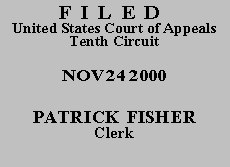
|
UNITED STATES OF AMERICA, Plaintiff-Appellee, v. JEFFERY L. TAYLOR, Defendant-Appellant. |
|
Before BRORBY, KELLY, and
MURPHY, Circuit Judges.
After examining the briefs and appellate record, this panel has determined unanimously that oral argument would not materially assist the determination of this appeal. See Fed. R. App. P. 34(a)(2); 10th Cir. R. 34.1(G). This court therefore honors the parties' requests and orders the case submitted without oral argument.
Jeffery Taylor pleaded guilty to three counts of possessing, with intent to distribute, cocaine base in violation of 21 U.S.C. § 841(a)(1). The district court sentenced Taylor to a 188-month term of imprisonment, a sentence at the absolute low end of the sentencing range set out in the United States Sentencing Guidelines ("U.S.S.G."). This case is before the court on counsel's brief filed pursuant to Anders v. California, 386 U.S. 738 (1967) and accompanying request to withdraw.(1) After a searching review of the record, we conclude that this court lacks jurisdiction to review the sentencing issue set forth in counsel's Anders brief (2) and that the appellate record reveals no other non-frivolous issues. Accordingly, this court grants counsel leave to withdraw and dismisses this appeal for lack of jurisdiction.
In March of 1999, Taylor was indicted on four counts of possessing cocaine base with intent to distribute in violation of 21 U.S.C. § 841(a)(1), one count of possessing a weapon following a felony conviction in violation of 18 U.S.C. § 922(g), and one count of carrying a firearm during and in relation to a drug trafficking crime in violation of 18 U.S.C. § 924(c). Taylor eventually entered an unconditional guilty plea to three of the possession-with-intent-to-distribute counts. In calculating Taylor's sentence under the U.S.S.G., the district court concluded that Taylor had a criminal history category of VI by operation of U.S.S.G. § 4B1.1.(3) It is uncontested that Taylor falls within the parameters of § 4B1.1 and Taylor never objected to the applicability of § 4B1.1 at sentencing. In fact, the only objection Taylor lodged at sentencing related to a proposed increase in his base offense level for obstruction of justice, an objection which the district court sustained. Otherwise, Taylor's counsel specifically acknowledged at the sentencing hearing that the presentence report was factually accurate and legally correct with respect to the U.S.S.G. calculations.
On appeal, Taylor asserts that the district court erred when it failed to sua sponte depart downward from the otherwise applicable U.S.S.G. sentencing range based upon the following two factors: (1) the passage of time between the offenses used to define Taylor as a career offender under § 4B1.1 and the offenses of conviction; and (2) Taylor's past and continuing cooperation with authorities. Setting aside the fact that this departure argument is raised for the first time on appeal and therefore waived,(4) this court has repeatedly noted, as counsel recognizes in his Anders brief, that "[a]bsent the trial court's clear misunderstanding of its discretion to depart, or its imposition of a sentence which violates the law or incorrectly applies the guidelines, we have no jurisdiction to review a refusal to depart." United States v. Coddington, 118 F.3d 1439, 1441 (10th Cir. 1997) (quotation omitted) (collecting cases). A review of the entire appellate record, with particular reference to the transcript of the sentencing hearing, reveals nothing to indicate the district court believed it lacked the power to depart downward on those bases belatedly advanced by Taylor on appeal. Nor is there any indication that the sentence was based upon an impermissible factor. Accordingly, this court lacks jurisdiction to review the district court's "refusal" to depart downward sua sponte.
This court hereby GRANTS counsel leave to withdraw and DISMISSES the appeal for lack of jurisdiction.
ENTERED FOR THE COURT
Michael R. Murphy
Circuit Judge
*. This order and judgment is not binding precedent, except under the doctrines of law of the case, res judicata and collateral estoppel. The court generally disfavors the citation of orders and judgments; nevertheless, an order and judgment may be cited under the terms and conditions of 10th Cir. R. 36.3.
1.Although counsel did not file a separate motion to withdraw, this court will treat counsel's Anders brief as containing such a motion. See Anders v. California, 386 U.S. 738, 744 (1967) ("[I]f counsel finds his case to be wholly frivolous, after a conscientious examination of it, he should so advise the court and request permission to withdraw. That request must, however, be accompanied by a brief referring to anything in the record that might arguably support the appeal.").
2.After the filing of counsel's Anders brief, this court advised Taylor that counsel had filed a brief stating a belief that the appeal was frivolous and requesting permission to withdraw from the case. The letter further informed Taylor that he had 30 days to respond to counsel's Anders brief. Taylor never filed a response.
3.Section 4B1.1 provides, in relevant part, as follows:
A defendant is a career offender if (1) the defendant was at least eighteen years old at the time the defendant committed the instant offense of conviction, (2) the instant offense of conviction is a felony that is either a crime of violence or a controlled substance offense, and (3) the defendant has at least two prior felony convictions of either a crime of violence or a controlled substance offense. . . . A career offender's criminal history category in every case shall be Category VI.
U.S.S.G. § 4B1.1 (emphasis added).
4.It should be noted, however, that Taylor's counsel did raise both issues in successfully arguing that the district court should sentence Taylor at the absolute low end of the U.S.S.G. sentencing range.